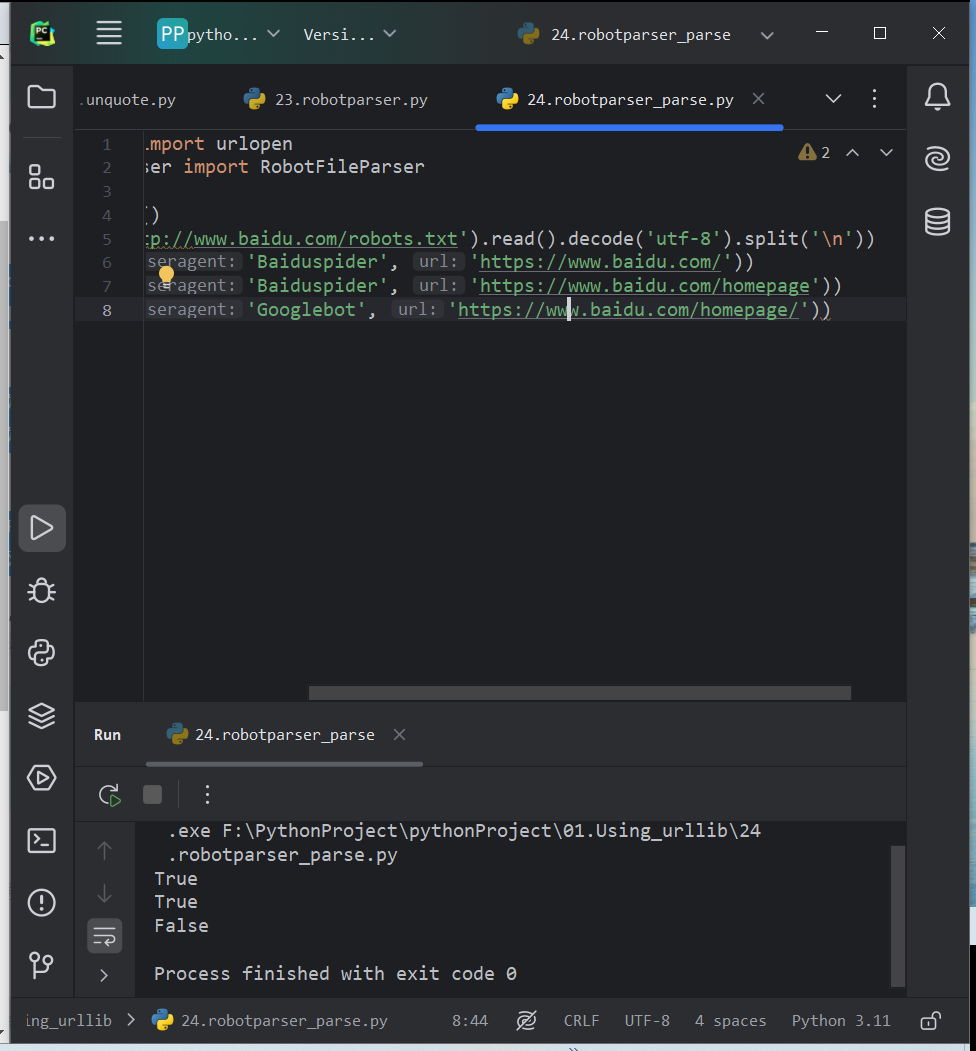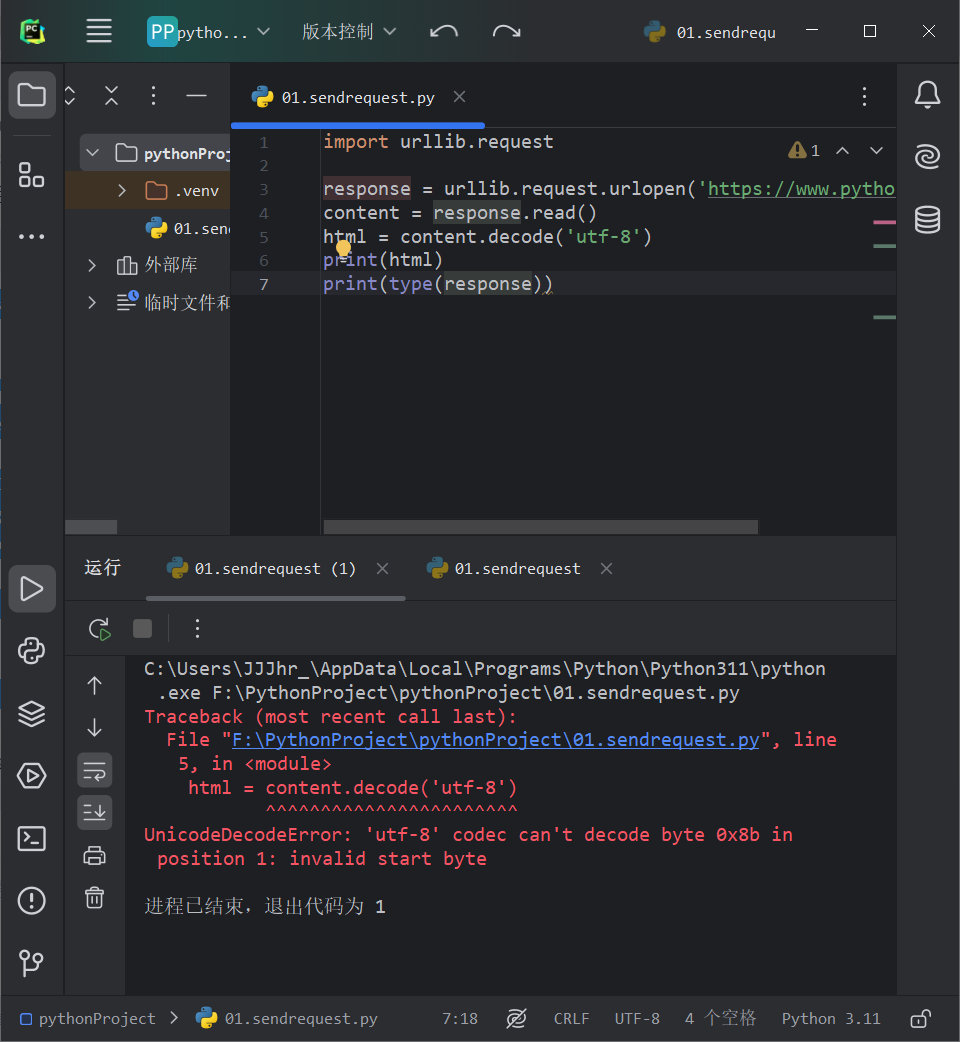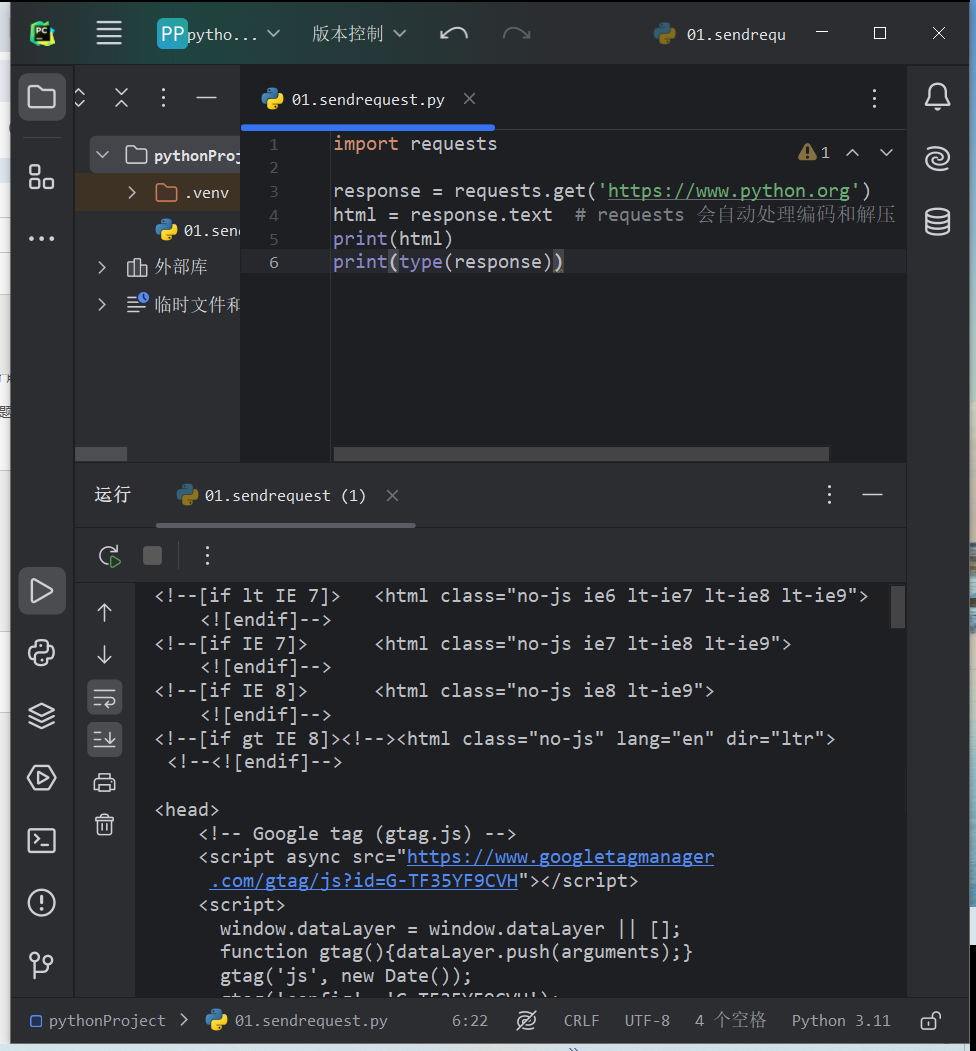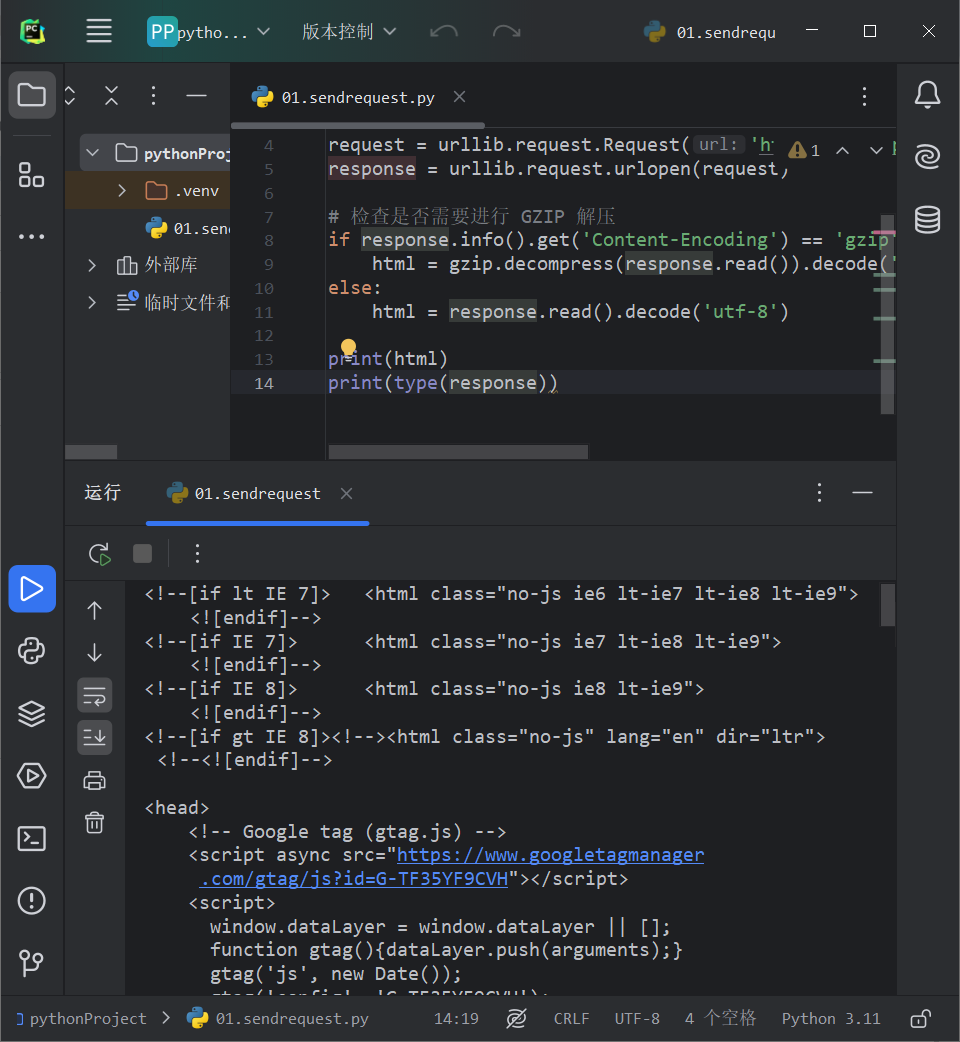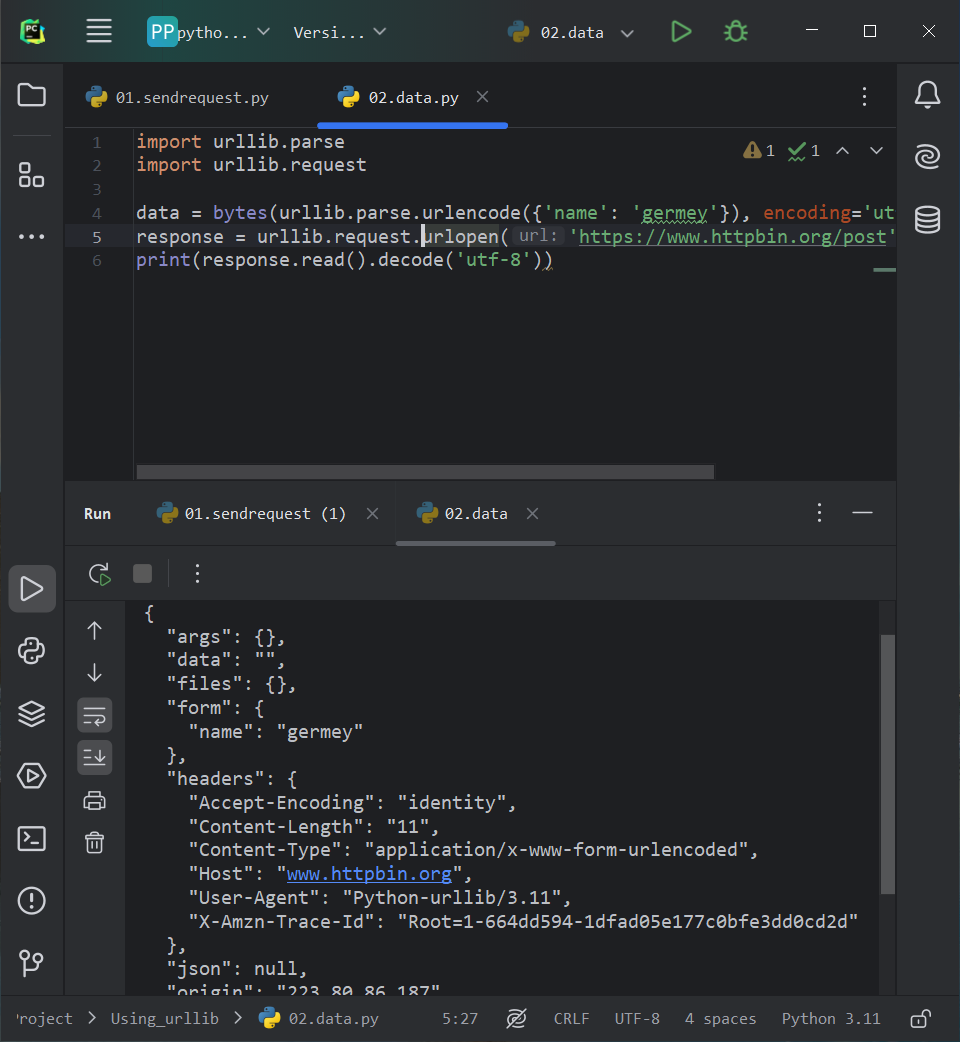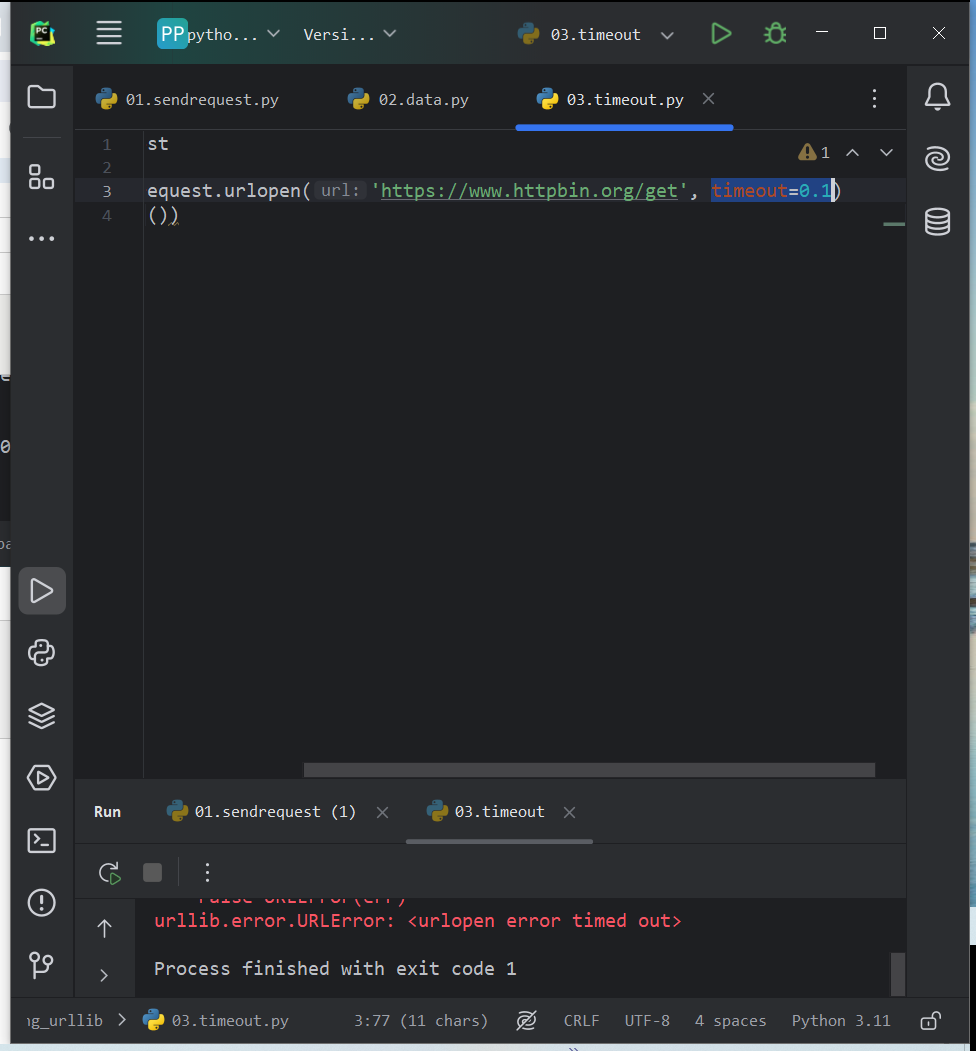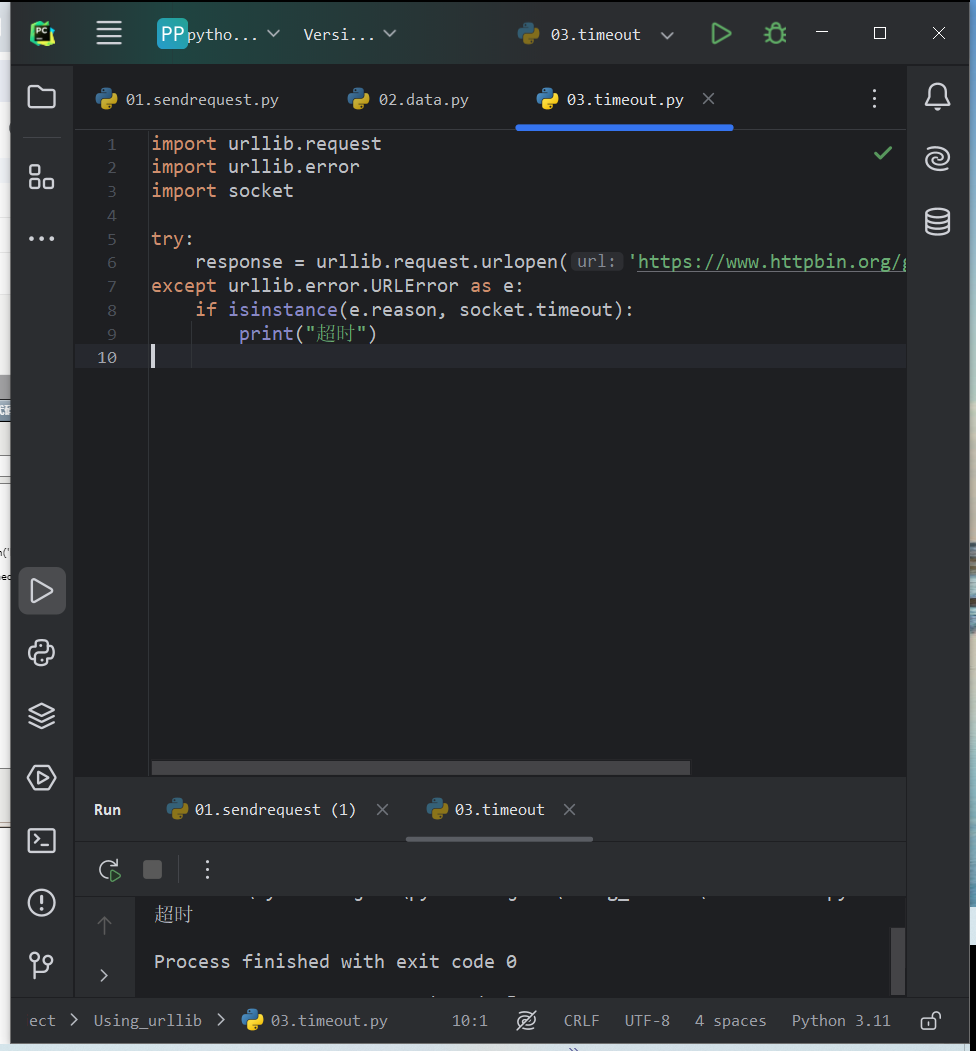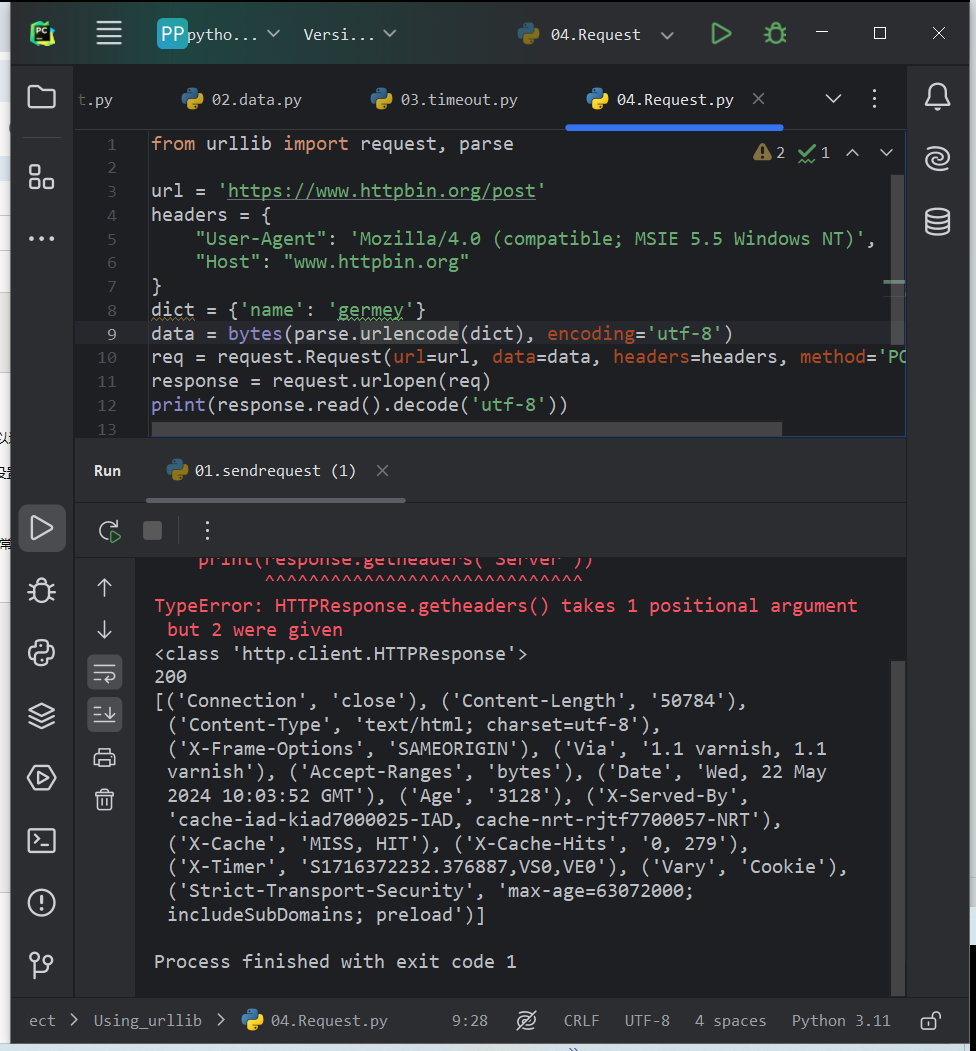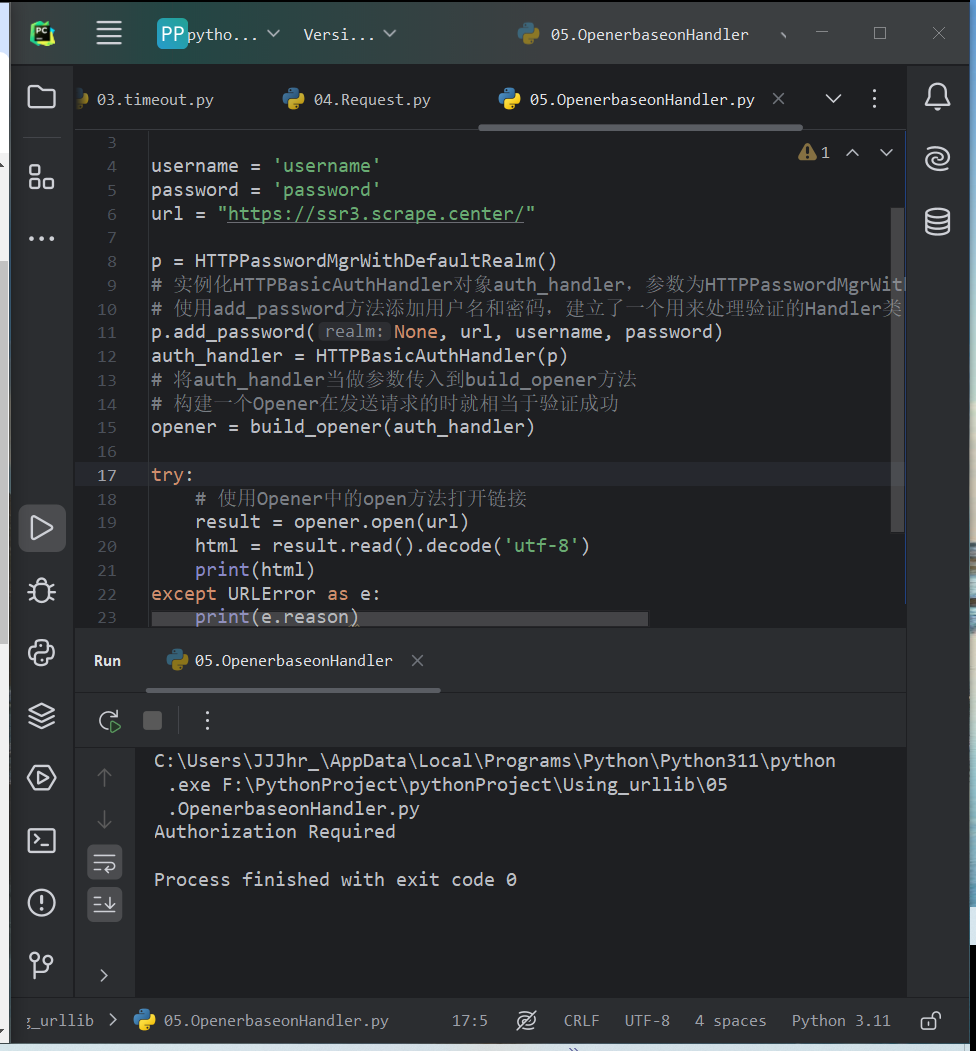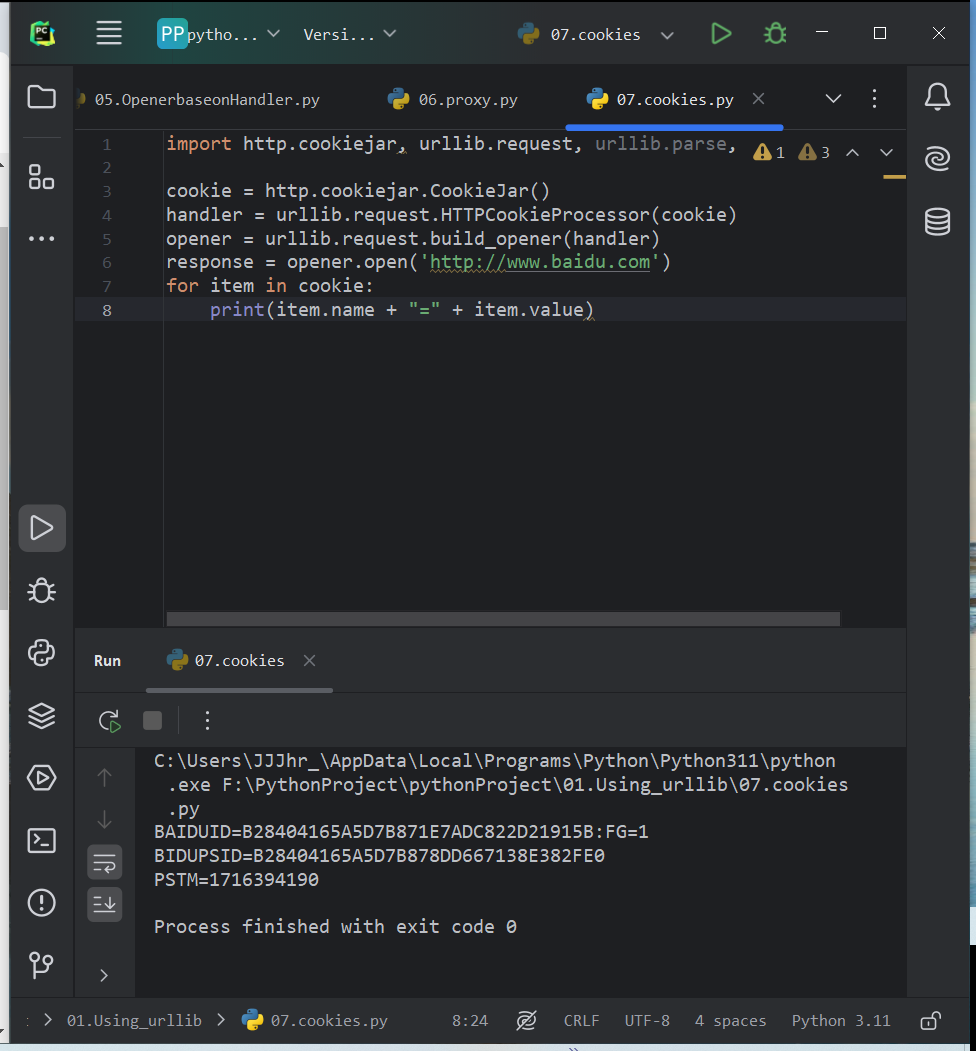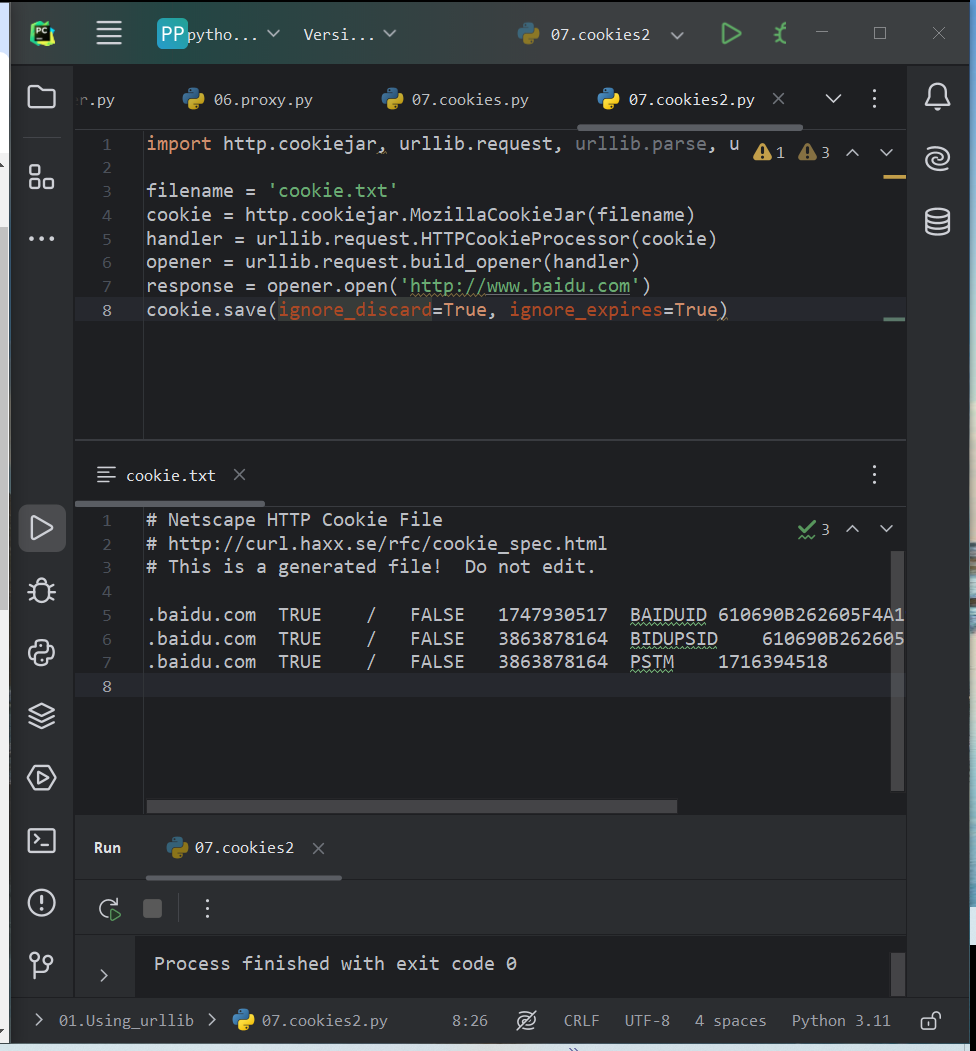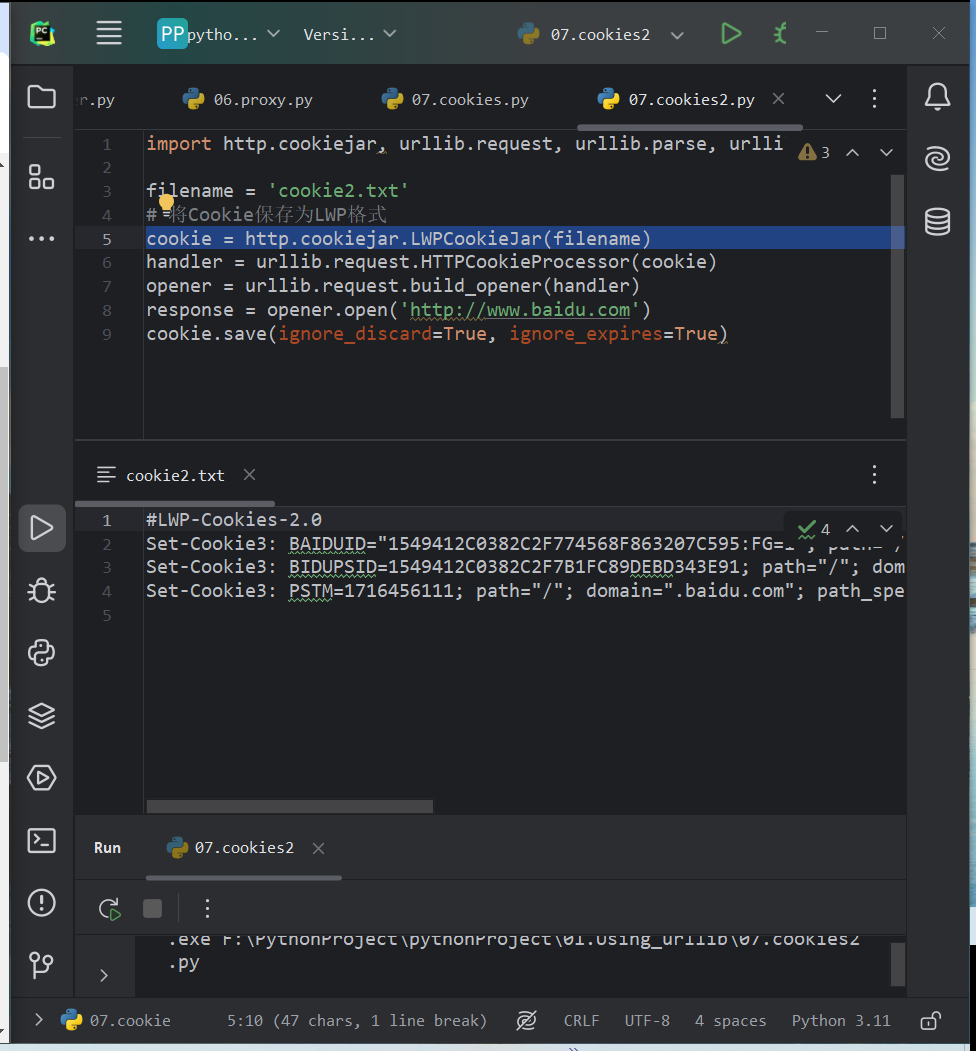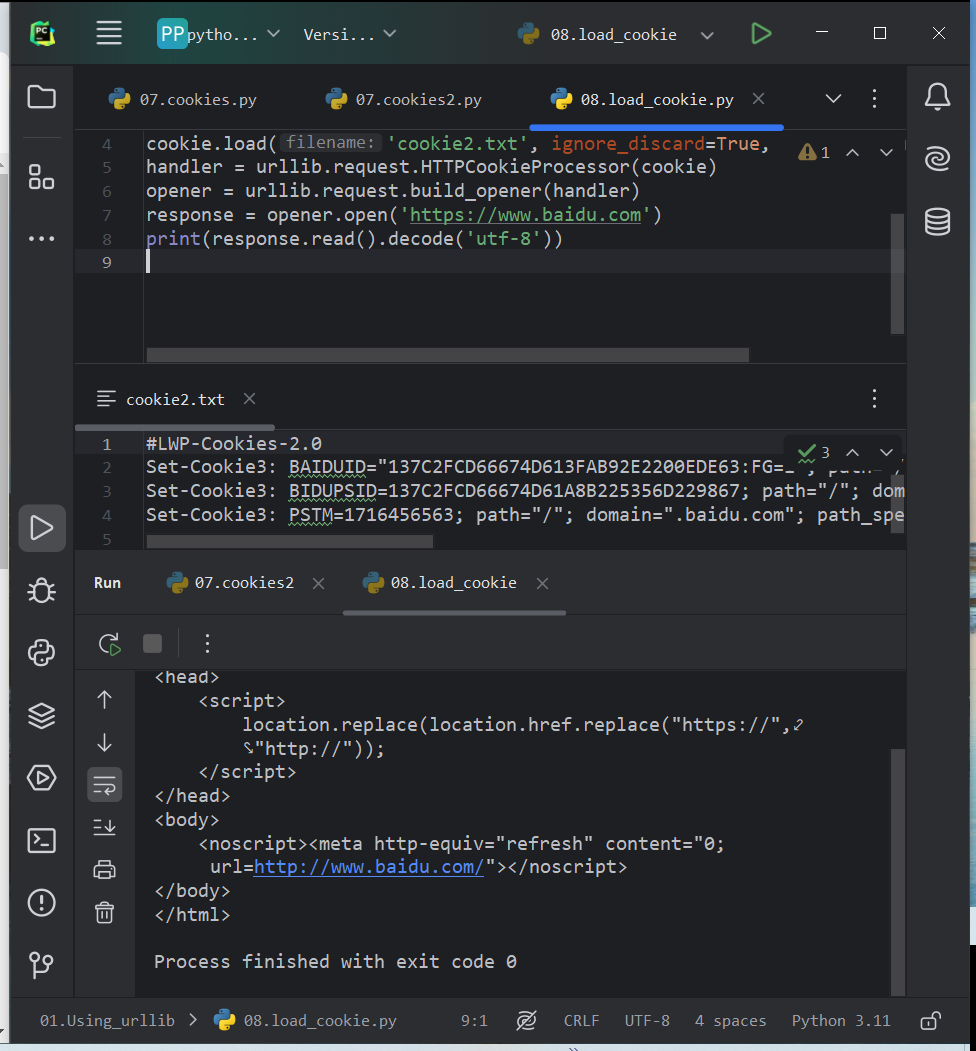urllib的使用
urllib的使用
处理异常
- URLError
来自urllib库的error模块,继承自OSError模块,是error异常模块的基类,由request模块产生的异常都可以通过捕获这个类来处理。
reason属性
from urllib import request, error
try:
response = request.urlopen('http://www.dailymile.com/404notfound')
except error.URLError as e:
print(e.reason)
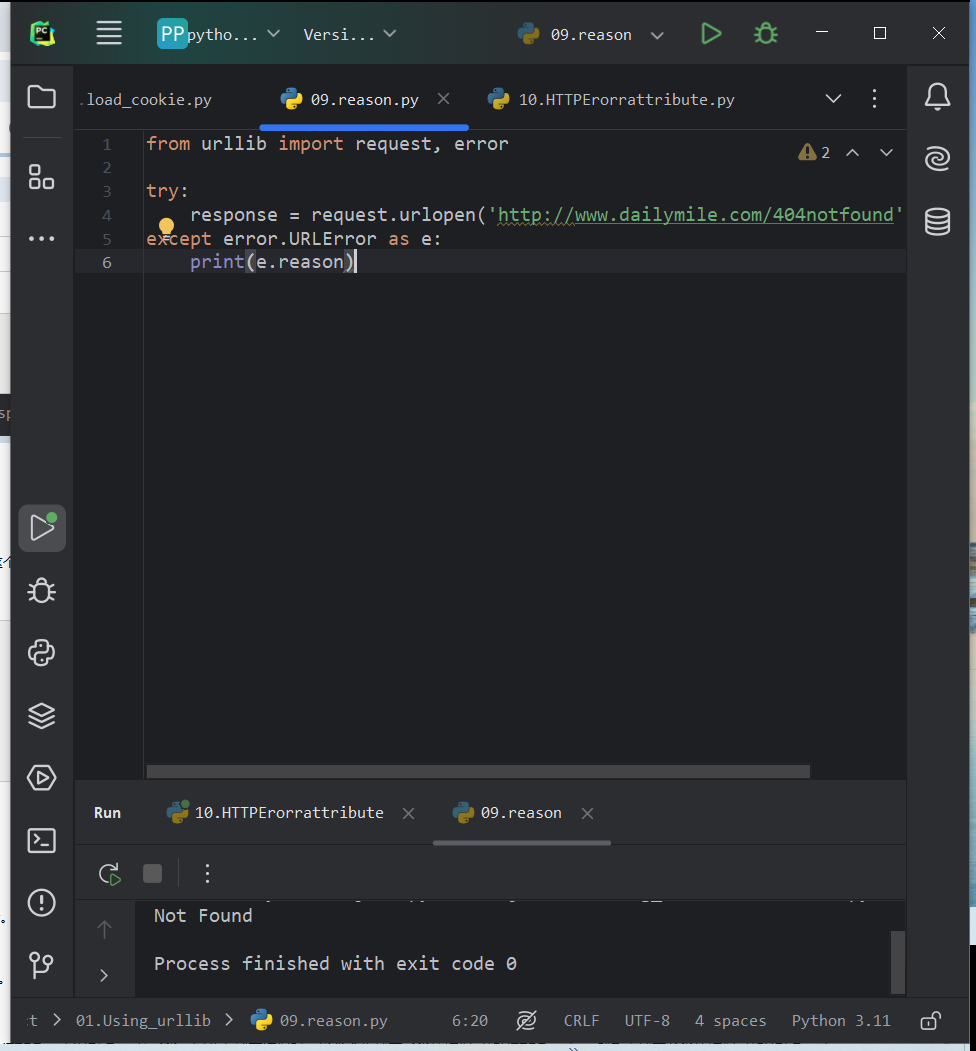
- HTTPError
URLError的子类,专门处理HTTP请求错误,如认证失败等。有以下三个属性。
code:这个属性返回HTTP状态码。HTTP状态码由三位十进制数字组成,出现在由HTTP服务器发送的响应的第一行。状态码分五种类型,由它们的第一位数字表示:4XX代表客户端错误,而5XX代表服务器错误。例如,404表示网页不存在,500表示服务器内部错误。
reason:这个属性返回错误的原因。与父类URLError一样,HTTPError的reason属性用于解释为何会出现HTTP错误。例如,当HTTP状态码为403时,reason可能返回“Forbidden”,表示服务器禁止访问。
headers:这个属性返回请求头。它包含了关于HTTP请求或响应的各种元信息。
在处理HTTPError时,可以通过访问这些属性来获取关于错误的详细信息,并据此采取适当的处理措施。同时,由于HTTPError是URLError的子类,因此在捕获错误时,通常会先捕获子类的错误(如HTTPError),然后再捕获父类的错误(如URLError)。
使用HTTPError捕获异常
from urllib import request, error
try:
response = request.urlopen('http://www.dailymile.com/404notfound')
except error.HTTPError as e:
print(e.reason, e.code, e.headers, sep="\n")
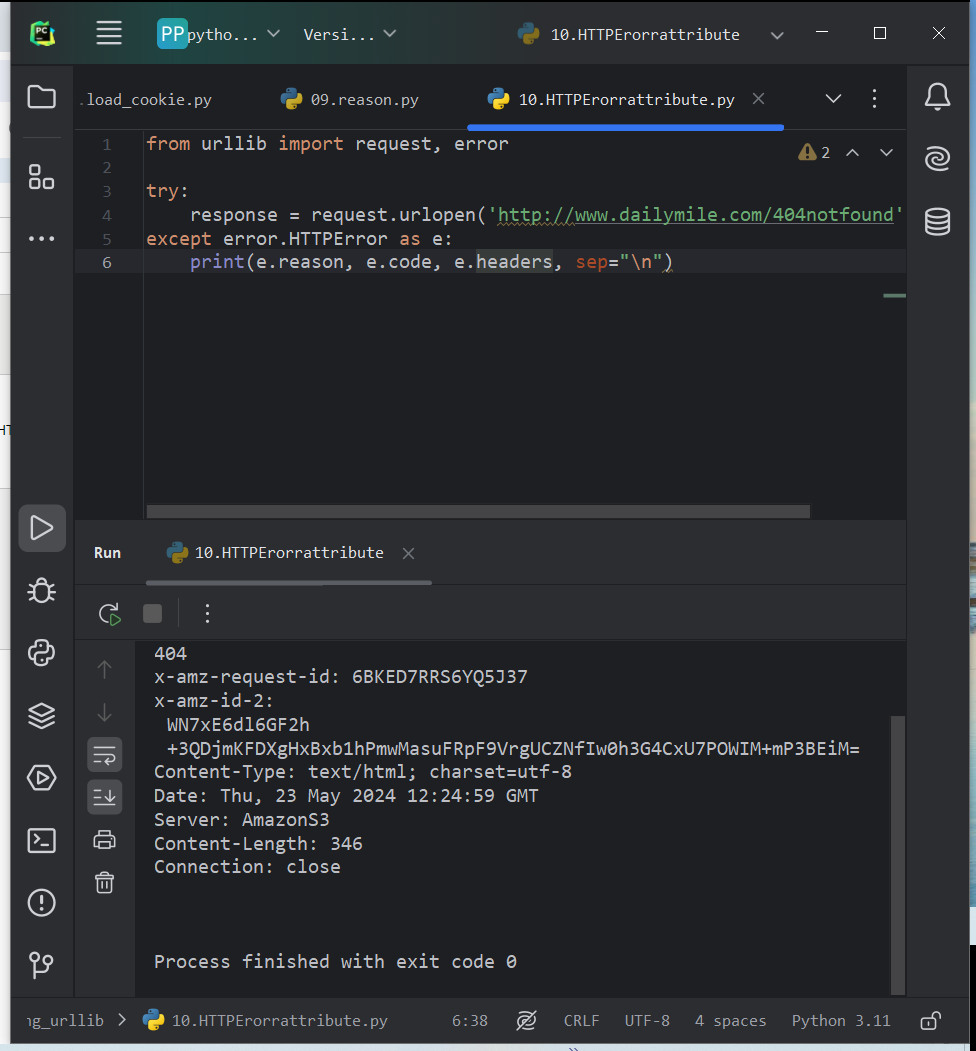
URLError是HTTPError的父类,可以先捕获子类的错误,再捕获父类,如下是更好的写法。先捕获HTTPError,获取错误原因、状态码、请求头等信息。若不是则捕获URLError异常,输出错误原因。
from urllib import request, error try: response = request.urlopen('http://www.dailymile.com/404notfound') except error.HTTPError as e: print(e.reason, e.code, e.headers, sep="\n") except error.URLError as e: print(e.reason) else: print('Request Successfully')
有时reson属性返回的不一定是字符串,也可能是一个对象。
import socket import urllib.request import urllib.error try: response = urllib.request.urlopen('http://www.baidu.com', timeout=0.01) except urllib.error.URLError as e: print(type(e.reason)) if isinstance(e.reason, socket.timeout): print("超时")
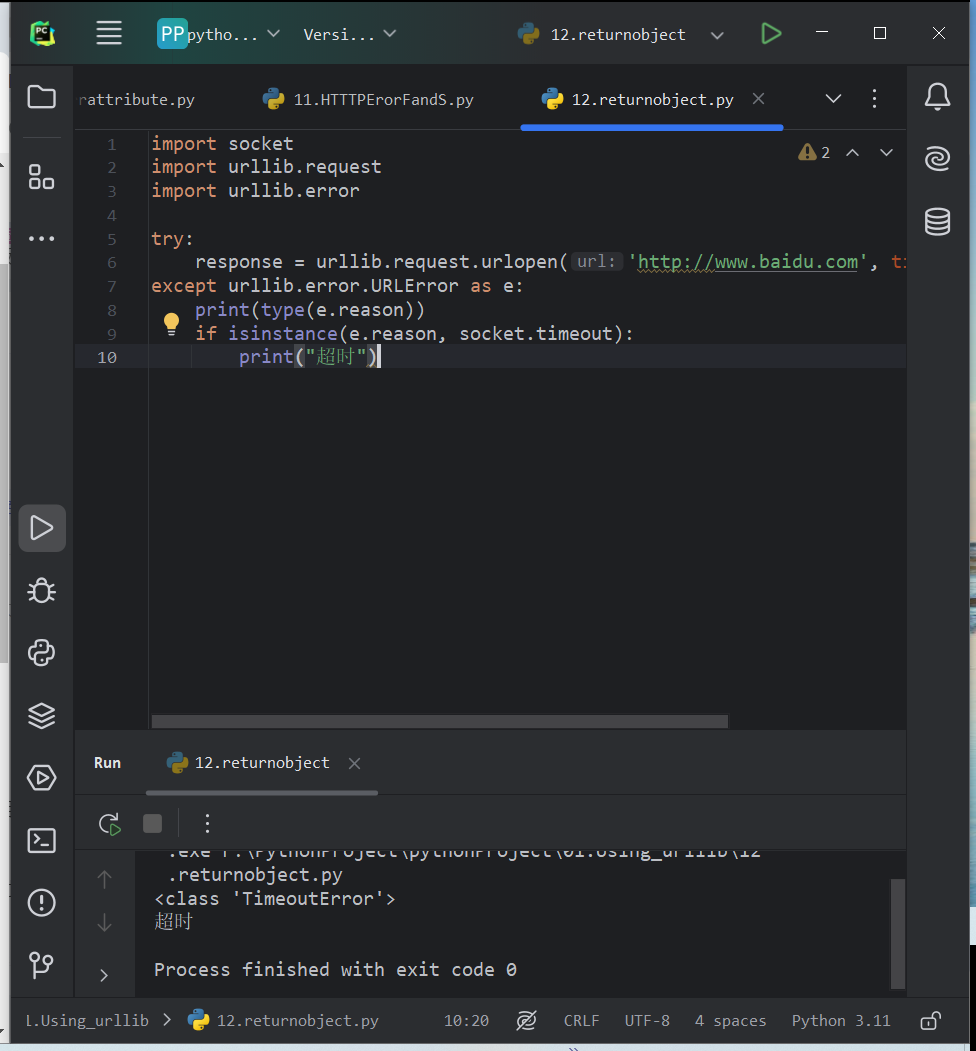
解析链接
urllib库提供了parse模块,定义了处理URL的标准接口,例如实现URL的各部分抽取、合并以及链接转换。
- urlparse:可以实现URL的识别和分段
from urllib.parse import urlparse result = urlparse('https://www.baidu.com/index.html;user?id=5#comment') print(type(result)) print(result)
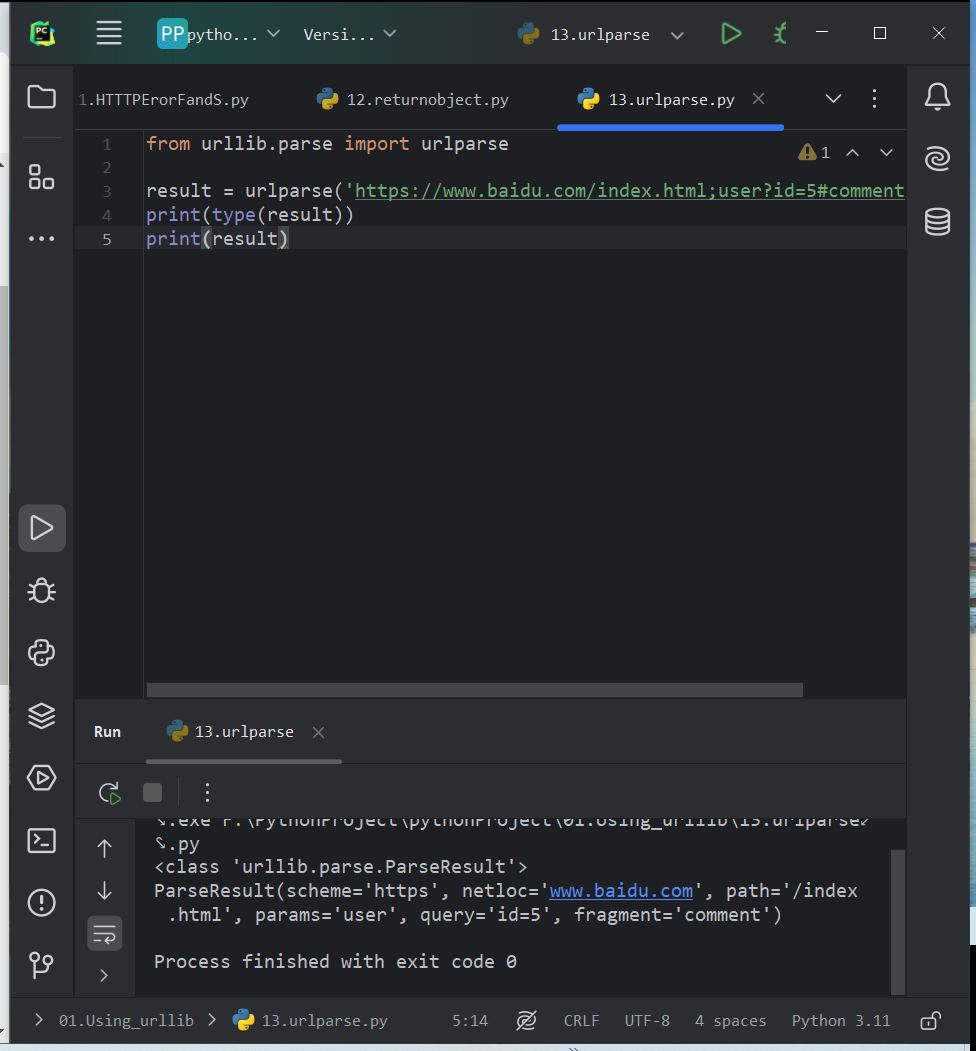
在 Python 的 urllib.parse 模块中,urlparse 方法通常接受一个 URL 字符串作为其主要参数,但也可以接受一个可选的 scheme、allow_fragments 参数。
urlstring:必选项,待解析的url
scheme:(可选的位置参数,但在现代用法中通常作为关键字参数传递):
默认的 URL scheme(如 'http', 'https', 'ftp' 等)。如果 URL 字符串中没有 scheme,并且提供了此参数,那么该 scheme 将被使用。但在现代 Python 版本中,通常将此参数作为关键字参数传递,而不是位置参数。
allow_fragments (关键字参数):
一个布尔值,指定 URL 是否可以包含片段(即 '#' 后面的部分)。默认为 True,表示 URL 可以包含片段。如果设置为 False,并且 URL 包含片段,那么片段部分将被视为路径的一部分。
scheme的使用:
from urllib.parse import urlparse result = urlparse('www.baidu.com/index.html;user?id=5#comment', scheme="https") print(result)
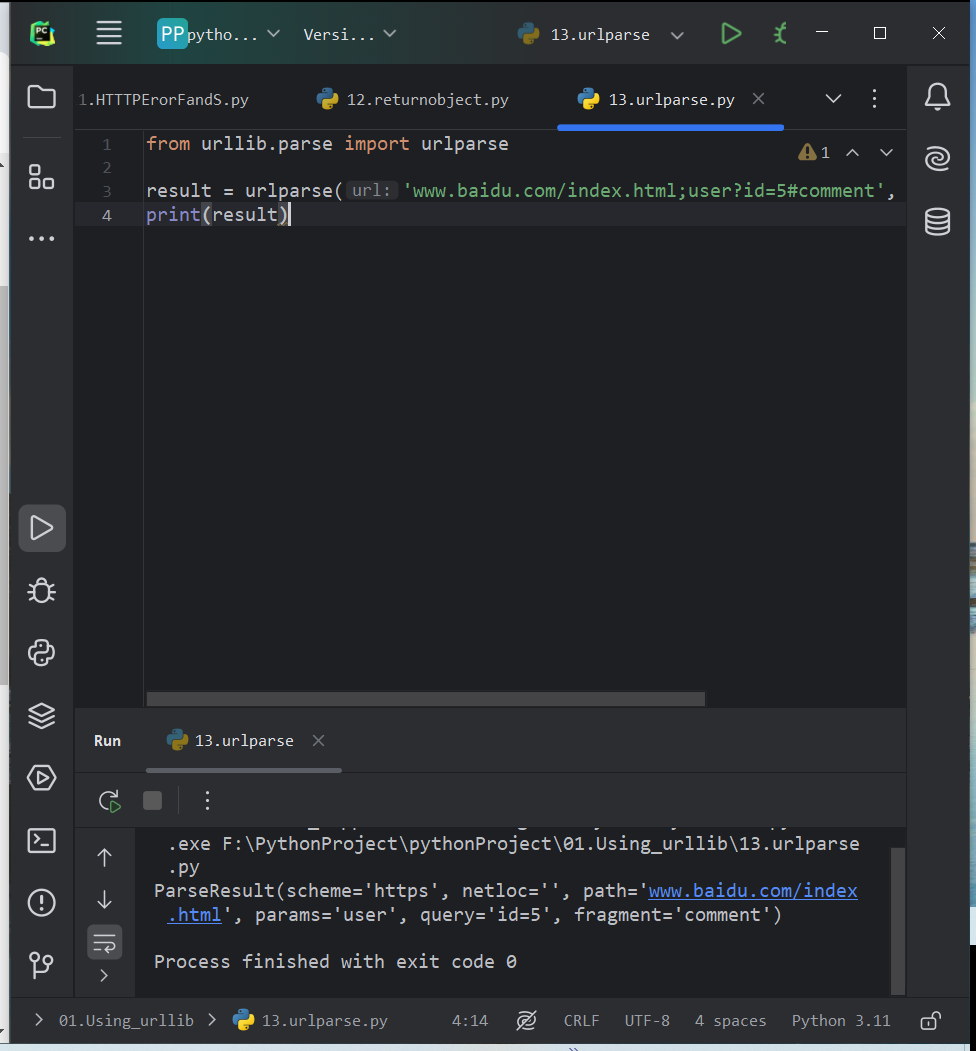
allow_fragments:
from urllib.parse import urlparse result = urlparse('https://www.baidu.com/index.html;user?id=5#comment', allow_fragments=False) print(result)
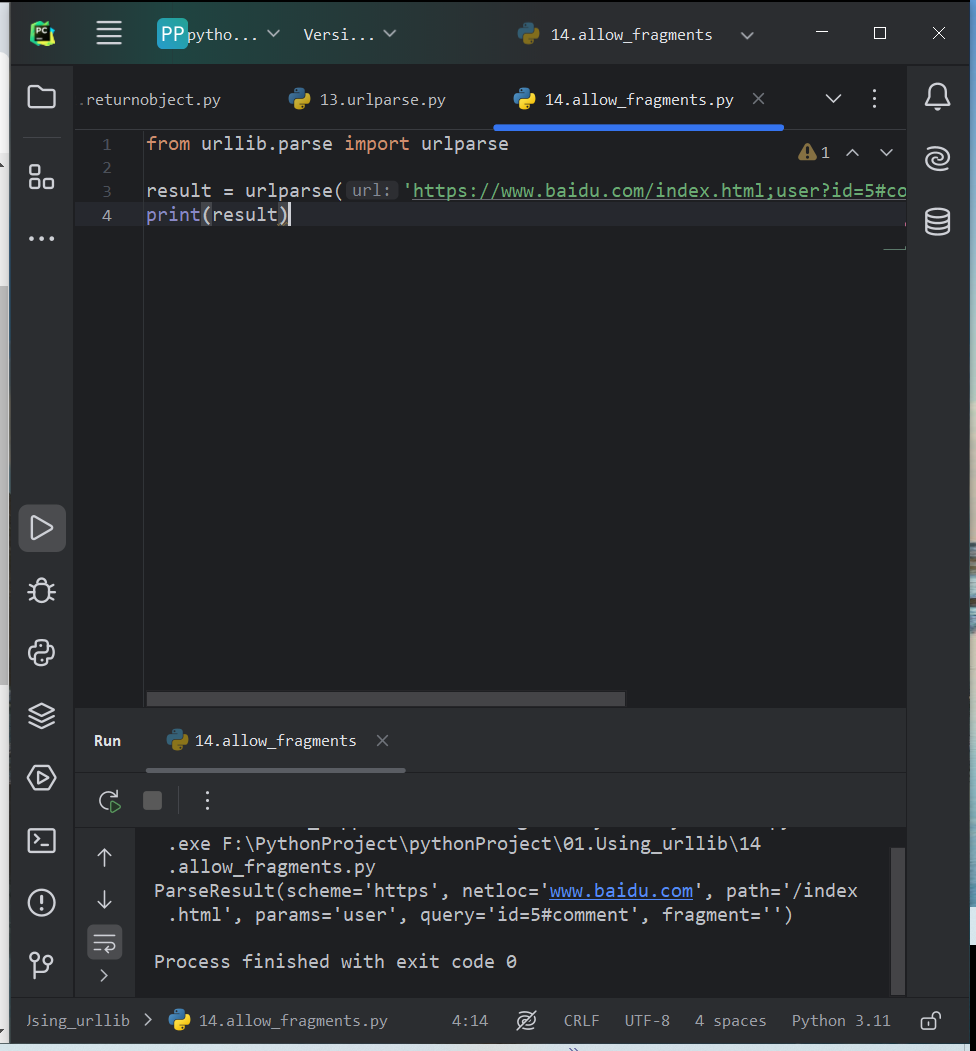
ParseResult是一个元组,既可以用属性名获取,可以用索引顺序获取
from urllib.parse import urlparse result = urlparse('https://www.baidu.com/index.html;user?id=5#comment', allow_fragments=False) print(result.scheme, result[0], result.netloc, result.path, result.query, result.fragment)

- urlunparse
用于构造URL。该方法收集的参数是一个可迭代对象,其长度必须为6,否则会抛出参数数量不足或者过多的问题
from urllib.parse import urlunparse data = ['https', 'www.baidu.com', 'index.html', 'user', 'a=6', 'comment'] print(urlunparse(data))
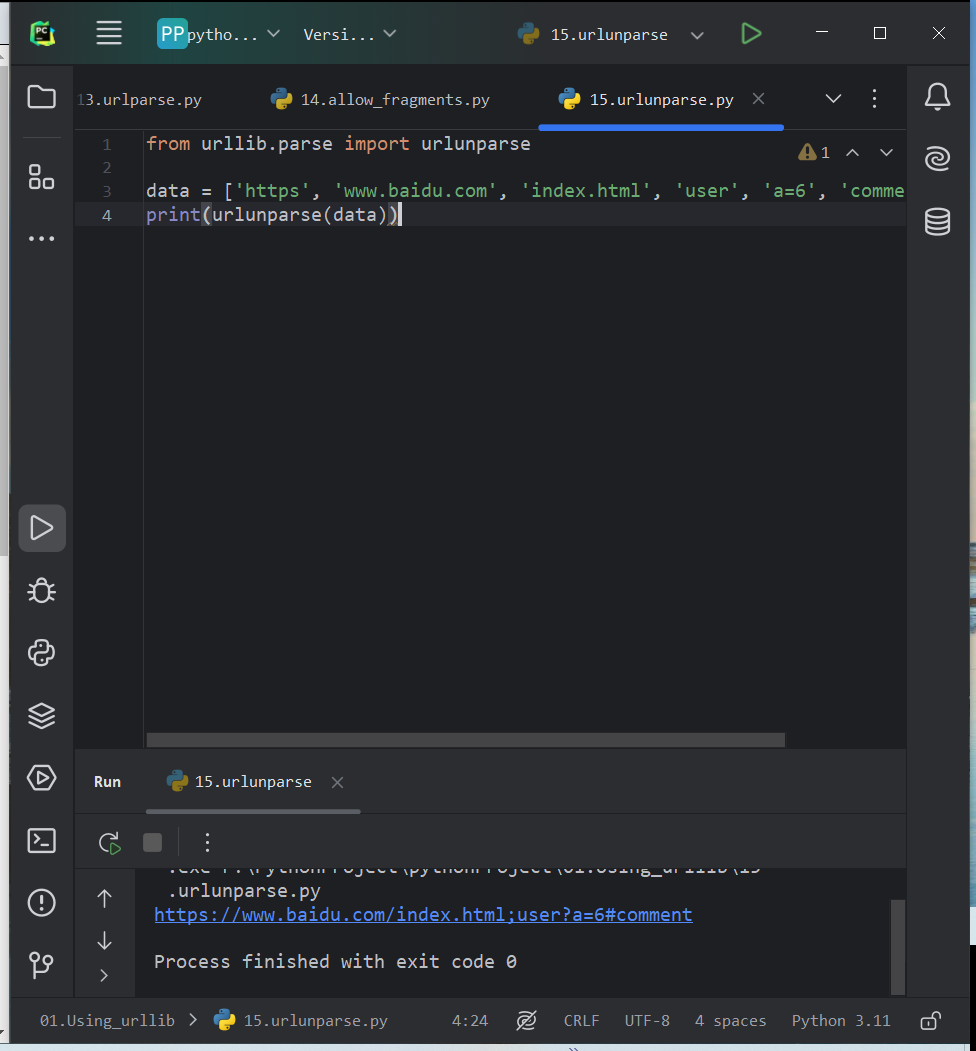
- urlsplit
和url方法相似,不再单独解析params这一部分(合并到path中)
from urllib.parse import urlsplit, urlunsplit result = urlsplit('https://www.baidu.com/index.html;user?id=5#comment') print(result)

- urljoin
可以提供一个base_url(基础链接)作为该方法的第一个参数,新链接作为第二个参数。urljoin会分析base_url的scheme、netloc和path这三个内容,并对新链接缺失的部分进行补充。
from urllib.parse import urljoin # 基础 URL base_url = "https://www.example.com" # 示例 1: 合并一个相对路径 relative_path_1 = "/about" full_url_1 = urljoin(base_url, relative_path_1) print(full_url_1) # 输出: https://www.example.com/about # 示例 2: 合并一个带有查询参数的相对路径 relative_path_2 = "/search?q=python" full_url_2 = urljoin(base_url, relative_path_2) print(full_url_2) # 输出: https://www.example.com/search?q=python # 示例 3: 合并一个包含协议和域名的完整 URL full_url_3 = urljoin(base_url, "https://www.another-example.com") print(full_url_3) # 输出: https://www.another-example.com (注意:如果第二个参数是一个完整的 URL,它会被直接返回) # 示例 4: 合并一个仅包含域名的 URL relative_domain_4 = "//www.another-example.com/contact" full_url_4 = urljoin(base_url, relative_domain_4) print(full_url_4) # 输出: //www.another-example.com/contact (注意:双斜杠表示协议与基础 URL 相同,但域名不同) # 示例 5: 合并一个仅包含路径的片段(没有开头的斜杠) relative_path_5 = "news/latest" full_url_5 = urljoin(base_url, relative_path_5) print(full_url_5) # 输出: https://www.example.com/news/latest
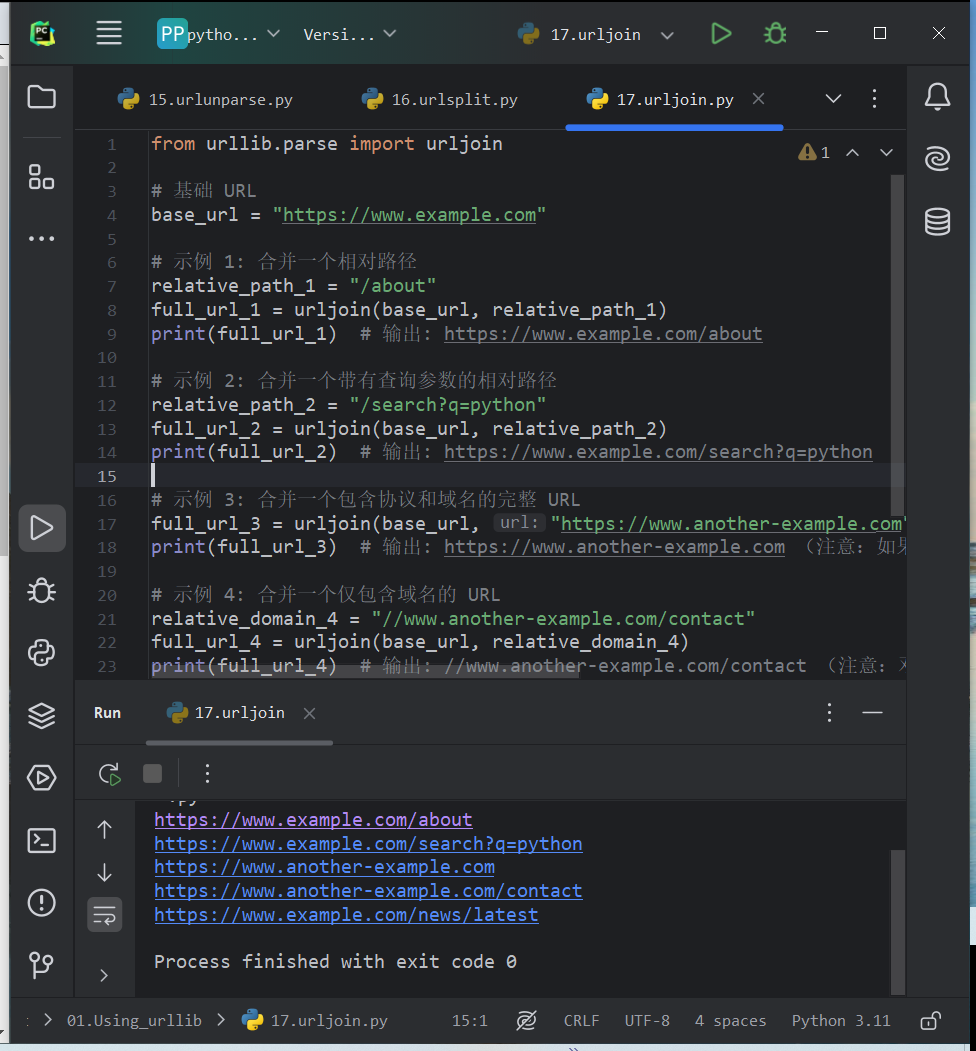
- urlencode
构造GET请求参数时常用,将字典转换为GET请求参数
from urllib.parse import urlencode params = { 'name': 'germey', 'age': 25 } base_url = "https://www.baidu.com?" url = base_url + urlencode(params) print(url)
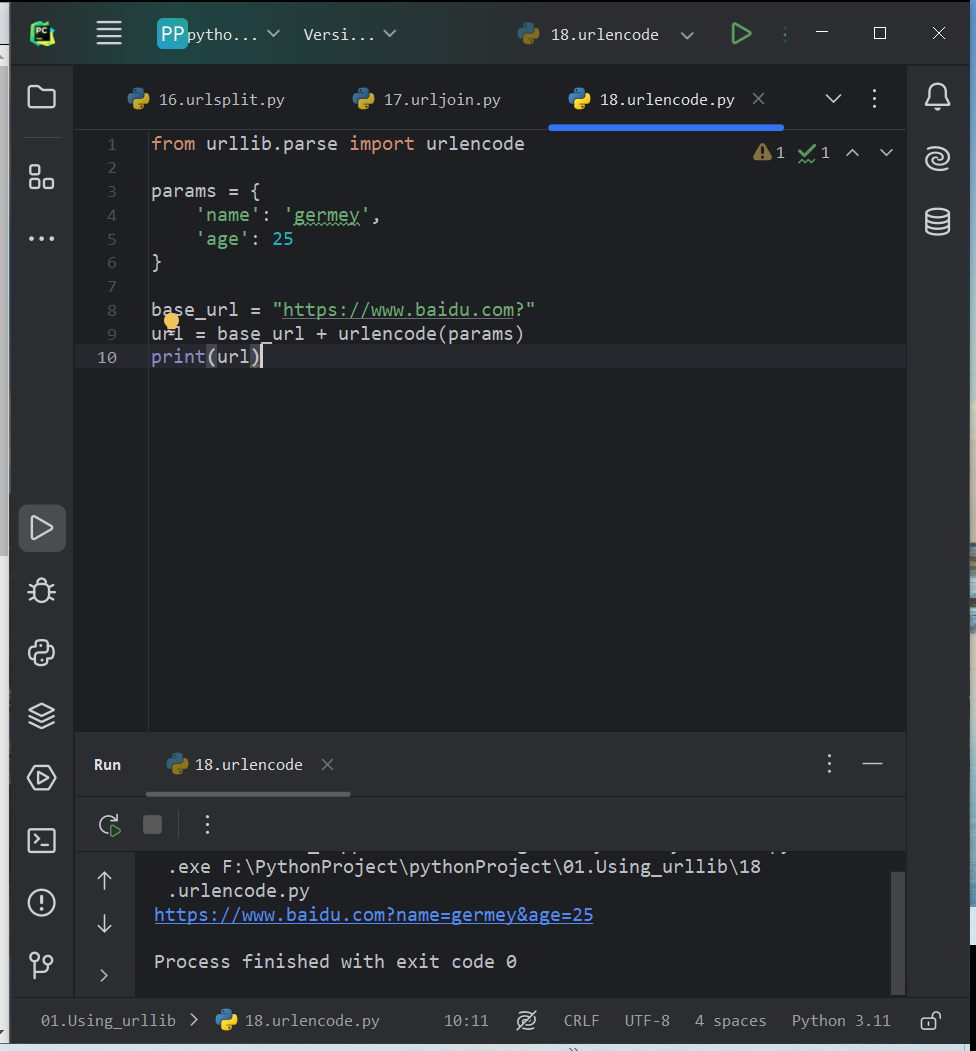
- parse_qs
反序列化,可将一串GET请求参数转回字典
from urllib.parse import parse_qs query = 'name=gerey&age=25' print(parse_qs(query))
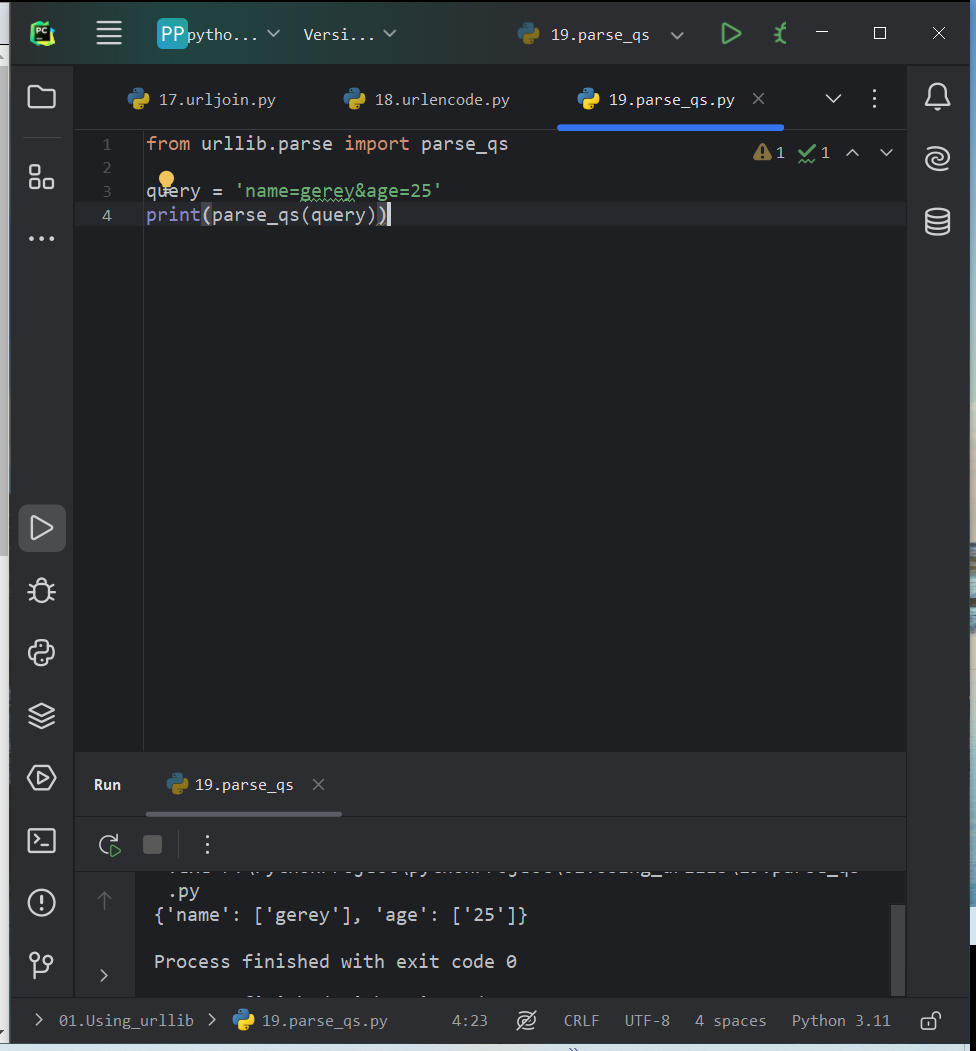
- parse_qsl
将参数转换为由元组组成的列表
from urllib.parse import parse_qsl query = 'name=gerey&age=25' print(parse_qsl(query))
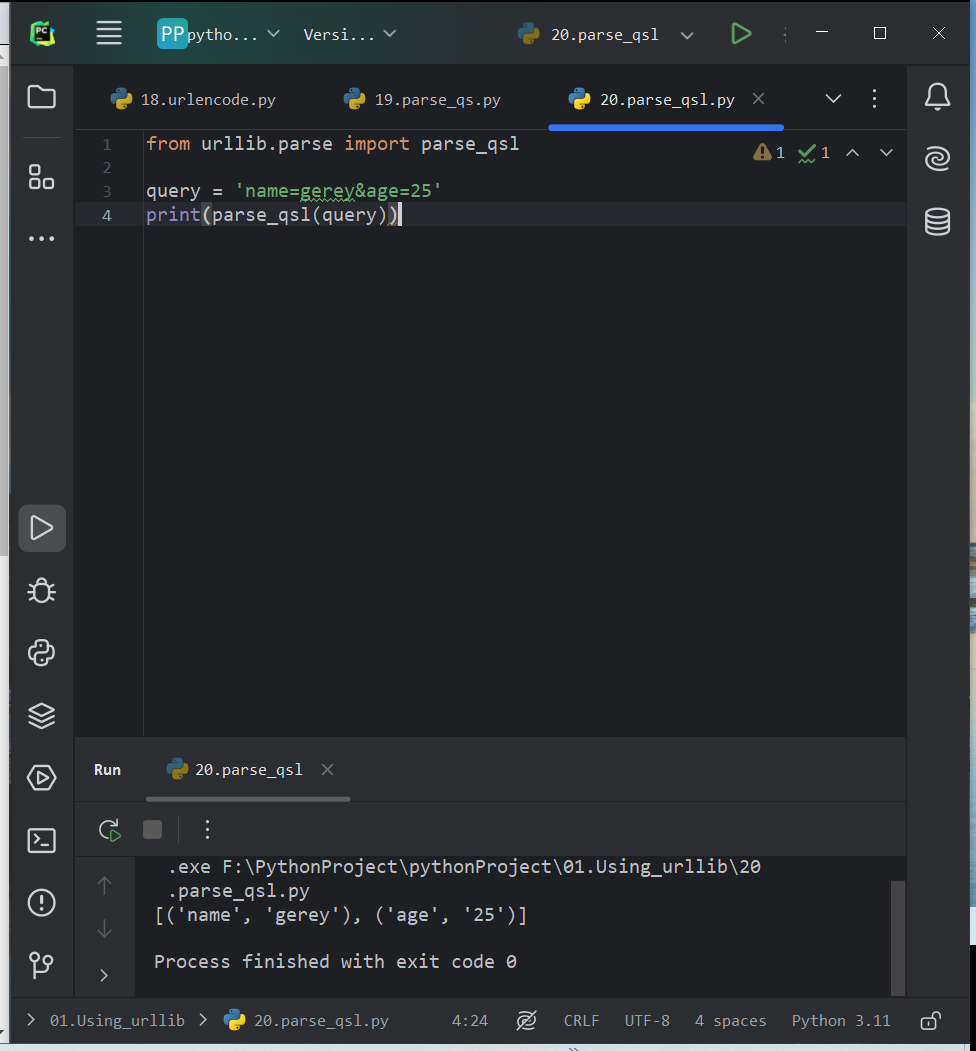
- quote
将URL转换为URL编码的格式。当URL中存在中文时可能会乱码,可以使用quote将中文转换成URL编码
from urllib.parse import quote keyword = '关键字' url = 'http://www.baidu.com/s?wd=' + quote(keyword) print(url)
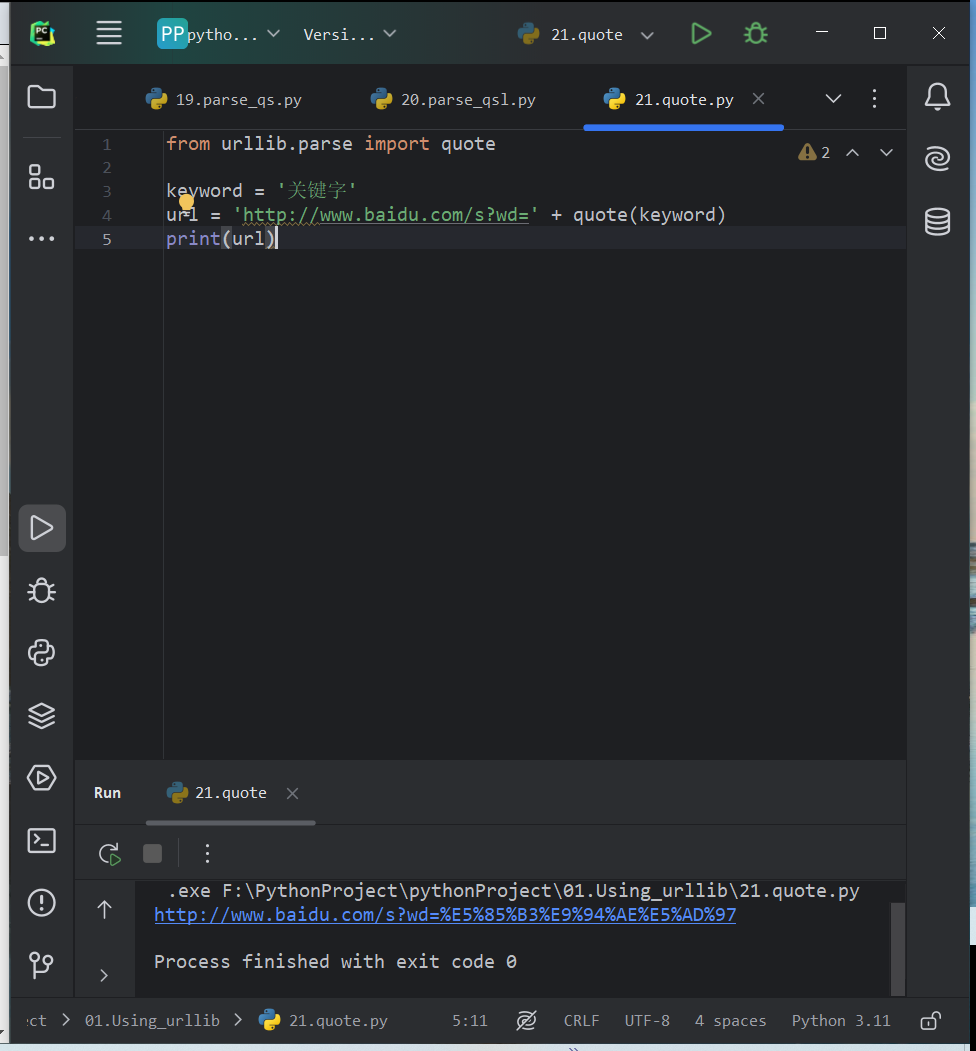
- unquote
进行url进行编解码
from urllib.parse import unquote URL = 'http://www.baidu.com/s?wd=%E5%85%B3%E9%94%AE%E5%AD%97' print(unquote(URL))
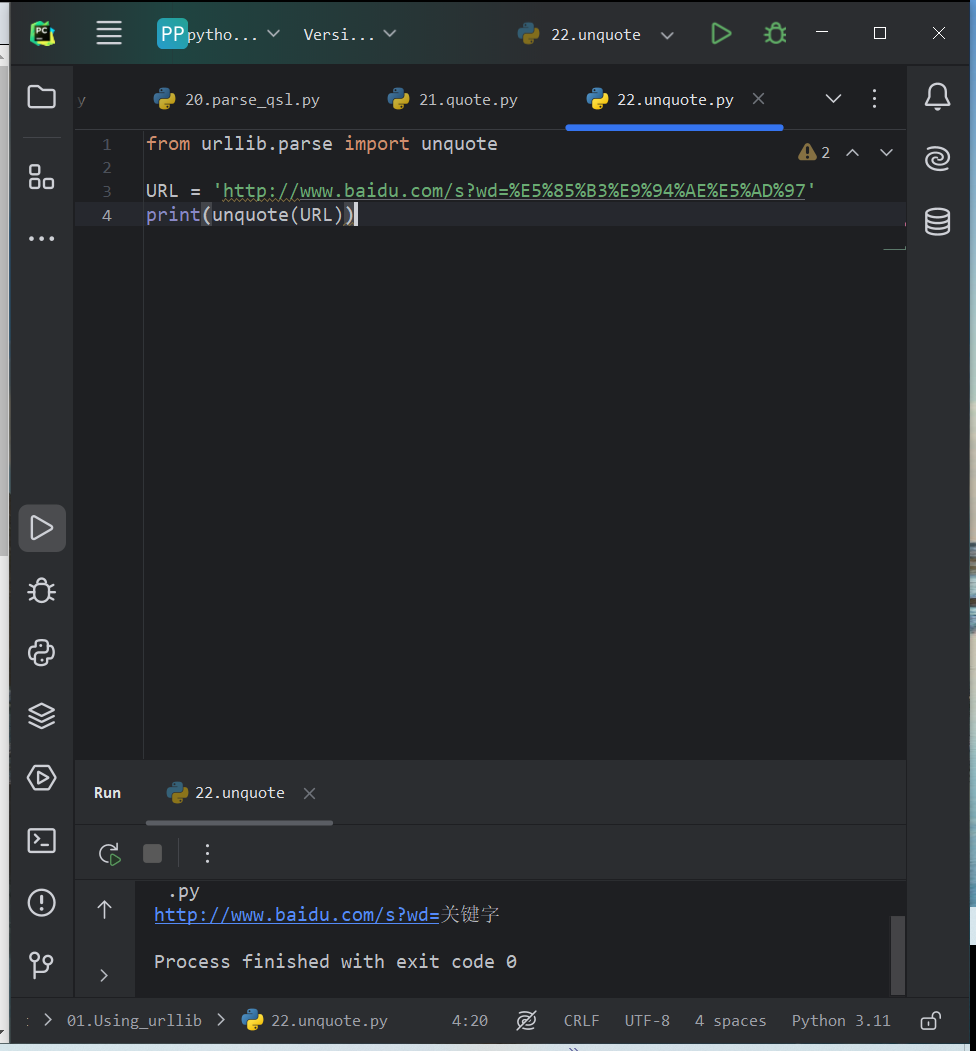
分析Robots协议
- Robots协议
Robots协议(也称为爬虫协议、机器人协议等),全称“网络爬虫排除标准”(Robots Exclusion Protocol),是一种用于规范网络爬虫行为的协议。通过Robots协议,网站管理员可以告诉网络爬虫哪些页面可以被爬取,哪些页面应该被忽略。
User-agent: 这一行用于定义应用该规则的搜索引擎爬虫的名称。可以指定具体的爬虫名称,如“Googlebot”或“Baiduspider”,也可以使用“*”通配符来代表所有爬虫。
User-agent: *
表示以下规则适用于所有搜索引擎爬虫。
Disallow: 这一行用于定义不允许爬虫访问的URL路径。可以指定具体的目录或文件,也可以使用通配符来匹配多个URL。
Disallow: /private/ Disallow: /admin/ Disallow: /cgi-bin/*.php
/private/ 和 /admin/ 目录下的所有内容都将被禁止访问。同时,/cgi-bin/ 目录下所有以 .php 结尾的文件也将被禁止访问。
Allow: 这一行(尽管不是robots.txt的标准部分,但一些搜索引擎爬虫会支持)用于定义允许爬虫访问的URL路径。如果同时存在Disallow和Allow规则,并且它们针对相同的URL路径,那么Allow规则将覆盖Disallow规则。
User-agent: Googlebot Allow: /some-directory/ Disallow: /some-directory/private/
Googlebot被允许访问/some-directory/目录下的内容,但/some-directory/private/目录下的内容除外
注释: 你可以使用#来添加注释,注释内容将被搜索引擎爬虫忽略。
# This is a sample robots.txt file. # All robots are welcome to index our site except for the private area. User-agent: * Disallow: /private/
空行和换行: 在robots.txt文件中,空行和换行通常被忽略。
文件大小: robots.txt文件的大小应尽可能小,以减少对服务器带宽的占用。同时,也应避免在文件中包含大量复杂的规则,以提高爬虫解析的效率。
文件位置: robots.txt文件必须位于网站的根目录下(即与网站的索引文件,如index.html或index.php等位于同一目录下),并且文件名必须全部小写。
- 爬虫名称
Googlebot:这是谷歌搜索引擎的爬虫。Googlebot从谷歌的网站索引和新闻索引中抓取网页,用于谷歌搜索引擎的搜索结果。
Baiduspider:这是百度搜索引擎的爬虫,也称为百度蜘蛛。Baiduspider会从互联网上抓取网页,用于百度搜索引擎的搜索结果。
Sogouspider:这是搜狗搜索引擎的爬虫。搜狗蜘蛛有多种,包括Sogou web spider、Sogou inst spider、Sogou spider2、Sogou blog、Sogou News Spider、Sogou Orion spider等,它们共同用于搜狗搜索引擎的网页抓取。
Sosospider:这是腾讯SOSO搜索引擎的爬虫。SOSO蜘蛛也会不断地从互联网上抓取网页,以更新SOSO搜索引擎的搜索结果。
YodaoBot:这是有道搜索引擎的爬虫。有道蜘蛛会从互联网上抓取网页,以支持有道搜索引擎的搜索服务。
- robotparser
可以使用robotparser模块来解析robots.txt文件。提供了RobotFileParser,可以根据robots.txt文件判断爬虫是否有权限爬取。
在构造方法里传入robots.txt文件的链接
urllib.robotparser.RobotFileParser(url='')
RobotFileParser的常用方法:
set_url(url):设置robots.txt文件的URL。如果在创建RobotFileParser对象时未传入URL,可以使用此方法设置。
read():读取robots.txt文件并进行分析。这个方法不会直接返回结果,但会执行读取文件的操作。在调用can_fetch()之前,必须先调用此方法,否则后续的can_fetch()判断将始终返回False。
can_fetch(useragent, url):判断指定的user-agent是否可以访问指定的URL。根据已解析的robots.txt文件中的规则进行判断,并返回True或False。
mtime():返回上次抓取和分析robots.txt文件的时间。这对于长时间运行的网络爬虫来说可能很有用,可以用来判断是否需要重新抓取和分析robots.txt文件。
modified():将当前时间设置为上次抓取和分析robots.txt文件的时间。这通常用于手动更新mtime()的返回值,以便爬虫知道何时需要再次检查robots.txt文件。
parse(lines):从给定的行参数中解析robots.txt文件的内容。这通常用于已经以某种方式获取了robots.txt文件内容的情况,而不是直接从网络上获取。
from urllib.robotparser import RobotFileParser rp = RobotFileParser() rp.set_url('http://www.baidu.com/robots.txt') rp.read() print(rp.can_fetch('Baiduspider', 'https://www.baidu.com/')) print(rp.can_fetch('Baiduspider', 'https://www.baidu.com/homepage')) print(rp.can_fetch('Googlebot', 'https://www.baidu.com/homepage/'))
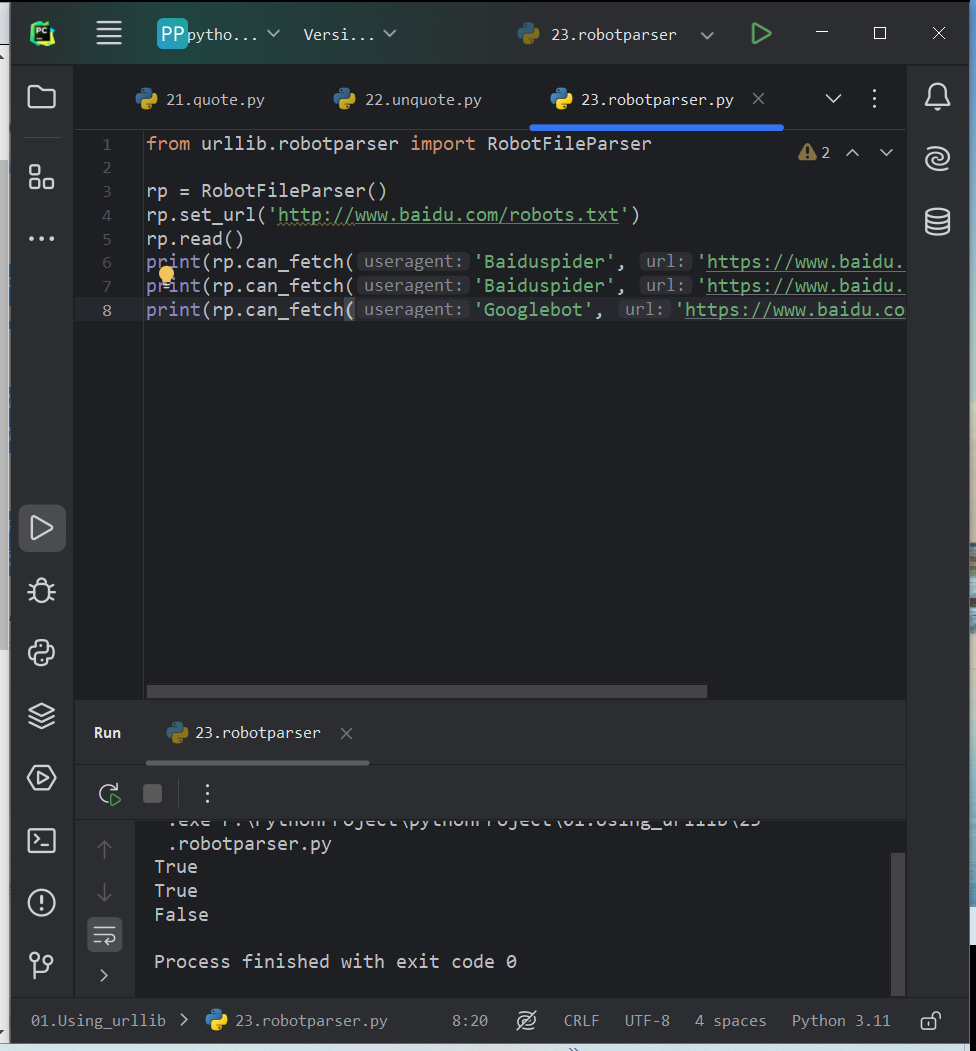
使用parse方法执行对robots.txt文件的读取和分析
from urllib.request import urlopen from urllib.robotparser import RobotFileParser rp = RobotFileParser() rp.parse(urlopen('http://www.baidu.com/robots.txt').read().decode('utf-8').split('\n')) print(rp.can_fetch('Baiduspider', 'https://www.baidu.com/')) print(rp.can_fetch('Baiduspider', 'https://www.baidu.com/homepage')) print(rp.can_fetch('Googlebot', 'https://www.baidu.com/homepage/'))
